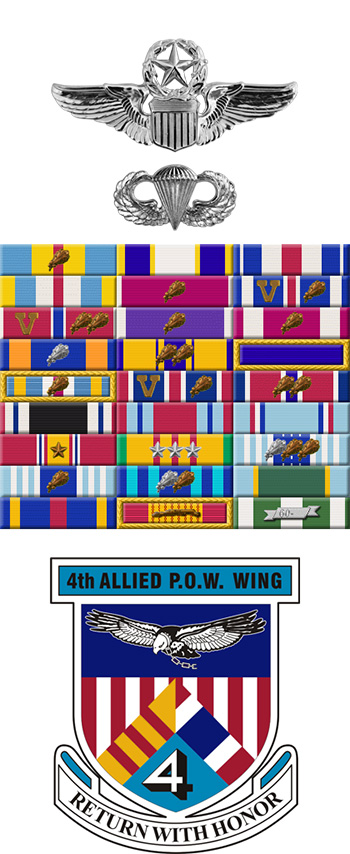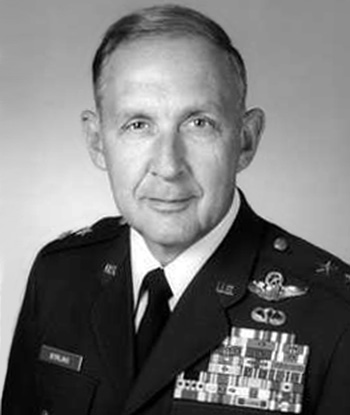
|
John L. Borling |
 |
|||
| Rank, Service | ||||
Major General O-8, U.S. Air Force |
||||
| Veteran of: | ||||
|
||||
| Tribute: | ||||
John Borling was born in 1940 in Chicago, Illinois. He entered the U.S. Air Force Academy in June 1959, and graduated with a commission as a 2d Lt in the U.S. Air Force on June 5, 1963. Lt Borling next completed pilot training and was awarded his pilot wings at Laredo AFB, Texas, in July 1964, followed by F-4 Phantom II Combat Crew Training from July 1964 to January 1965. His first assignment was as an F-4 pilot with the 433rd Fighter Squadron at George AFB, California, and then deployed to Ubon Royal Thai AFB, Thailand, from February 1965 until he was forced to eject over North Vietnam and was taken as a Prisoner of War on June 1, 1966. After spending 2,449 days in captivity, Capt Borling was released during Operation Homecoming on February 12, 1973. He was briefly hospitalized to recover from his injuries at Scott AFB, Illinois, and then completed T-38 recurrency training and Instructor Pilot Instrument School before serving as a White House Fellow from August 1974 to August 1975. Maj Borling next attended Armed Forces Staff College at Norfolk, Virginia, from August 1975 to January 1976, followed by service as an F-15 Eagle pilot, Assistant Operations Officer and then Operations Officer with the 71st Tactical Fighter Squadron at Langley AFB, Virginia, from January 1976 to March 1977. From March to November 1977, Col Borling served as Operations Officer for the 94th Tactical Fighter Squadron at Langley, and then as Chief of the Operations Training Division for the 1st Tactical Fighter Wing at Langley from November 1977 to July 1978. His next assignment was as Commander of the 94th Tactical Fighter Squadron from July 1978 to August 1979, followed by National War College at Fort McNair, Washington, D.C., from August 1979 to July 1980. He then served as Chief of the Checkmate Group and as Assistant Director for Operational Initiatives and Joint Matters with Headquarters U.S. Air Force in the Pentagon from July 1980 to March 1982. His next assignment was as Commander of the 86th Combat Support Group at Ramstein AB, West Germany, from March 1982 to July 1983, followed by service as Commander of the 86th Fighter Group at Ramstein from July 1983 to July 1984. Col Borling then served as Senior Special Assistant to the Chief of Staff and as Executive and Principal Staff Officer to the Chief of Staff with Supreme Headquarters Allied Powers Europe at Mons, Belgium, from August 1984 to June 1986, and then on the staff of Headquarters Strategic Air Command at Offutt AFB, Nebraska, from June 1986 to June 1987. Gen Borling next served as Commander of the 57th Air Division at Minot AFB, North Dakota, from June 1987 to June 1988, followed by service as Assistant to the Deputy Chief of Staff for Operations with Headquarters Strategic Air Command at Offutt AFB from June 1988 to July 1989. He then served as Assistant Deputy Chief and Deputy Chief of Staff for Operations with Headquarters Strategic Air Command from July 1989 to February 1991. Gen Borling served as Director of Operational Requirements with Headquarters U.S. Air Force in the Pentagon from January 1991 to January 1992, and then as Deputy Chief of Staff for Air with Headquarters Air Force North in Kolsas, Norway, from January 1992 to June 1994. His final assignment was as Chief of Staff with Headquarters Allied Forces North Europe at Stavanger, Norway, from June 1994 until his retirement from the Air Force on August 1, 1996. General Borling is a Command Pilot with more than 3,000 flying hours in fighter, bomber, tanker, and reconnaissance aircraft. After his retirement from the Air Force, John served as President/CEO of Chicago's United Way, he ran for Congress in 2004 and 2006, he founded and is currently the CEO of SOS America, and he is currently Chairman of Performance Consulting Group. He is married to his high school sweetheart, Myrna, also from Illinois, and they have two daughters. |
||||
|
||||

